- Home
- James Luceno
Star Wars: New Jedi Order: Agents of Chaos I: Hero's Trial Page 8
Star Wars: New Jedi Order: Agents of Chaos I: Hero's Trial Read online
Page 8
“What’s it been, Roa—thirty years?”
“I couldn’t tell you exactly when, but I can tell you where. Departure terminal of Roonadan Spaceport in the Corporate Sector. You and a lovely, dark-haired young woman were waiting to board the Lady of Mindor to Ammuud, I believe.”
“Fiolla of Lorrd,” Han said, as if snatching the name from thin air. He gestured with his chin toward Roa. “You had on a white business suit, with some kind of rainbow sash. . . ”
“And you, my young friend, were wearing an especially wary look.” Roa’s rheumy blue eyes glinted. “You told me you were out of the business, running a collection agency. Han Solo Associated, wasn’t it? The next thing I hear, you’ve won the Battle of Yavin single-handed.”
“Not true,” Han said, “I had help.”
Roa stroked his clean-shaven jaw. “Let’s see, then I heard that you’d had yourself encased in carbonite—for posterity, I assumed at the time.”
Han narrowed his eyes. “Actually, I was thinking of marketing molds of myself.”
Roa laughed, then showed him a look of mild rebuke. “I warned you about working with the Hutts.”
“You should have warned Jabba about working with me.”
Han appraised Roa’s Askajian suit, chromasheath ankle boots, and the rings that sparkled on the pinkies of his plump hands. Roa was already the grand old man of the smuggling trade when the late Mako Spince had introduced Han to him on Nar Shaddaa. Honorable, good-natured, and generous to a fault, Roa had launched many a young outlaw into the business, including Han, whom Roa had brought through his first Kessel Run. Han had even worked for him for a time, and along with Chewie, Lando, Salla Zend, and a couple of the other Nar Shaddaa regulars, had attended Roa’s wedding, after which the old man had retired from smuggling, at his wife’s insistence.
“So, you still in import-export?”
“Sold everything—almost ten years ago now.”
Han studied him some more. “Roa, you don’t look like you’ve aged a day since Roonadan.”
“Nor do you,” Roa said, almost convincingly.
Han smiled lopsidedly and tapped his forefinger against his front teeth. “Regrown.” He touched his nose. “Broken and repaired so many times there’s hardly any original tissue left. Plus, my face is all out of whack. This eye’s higher than the other one.”
“And you think I come by my youthful appearance naturally?” Roa asked theatrically.
“Don’t tell me, you’re a clone, right?”
Roa laughed. “Next best thing: rejuvenation therapy, coupled with some daily myostim.” He displayed a noble profile. “I instructed the cosmeds to leave just enough age to keep me looking distinguished.”
“And you do, you old scoundrel.”
“Besides, the treatments were Leia’s idea—mostly.”
Han had an image of Roa’s rich-voiced, blond-haired, elegant wife. “How is she?”
Roa smiled weakly. “She died a few months back.”
Han’s lips became a thin line. “I’m sorry to hear that, Roa.”
Roa didn’t respond immediately. “And I was sorry to hear about Chewbacca, Han. I actually tried to obtain authorization to visit Kashyyyk for the memorial, but you know how Wookiees can be about granting permission to humans.”
Han nodded. “They’ve got a long memory for what the Empire did to them,”
“Who doesn’t.”
Han was quiet for a moment. “So what brings you to Coruscant? I thought you liked wide open space.”
Roa’s eyes darted. “To tell you the truth, Han—you. You’re the reason I’m here.”
Han felt a shiver pass through him. Because of a series of unexpected encounters with Roa over the years, in out-of-the-way places like Nar Shaddaa and Roonadan, the old man had become one of those people who made Han wonder if the galaxy wasn’t a lot smaller than he’d been led to believe, regardless of his own far-ranging journeys.
“Somehow I expected you to say that,” he said at last.
Roa put his hands on Han’s shoulders. “What do you say we go someplace where we can talk?”
Han nodded. “There’s a restaurant in the transport center.”
They rode the beltway indoors, talking about old friends—Vonzel, Tregga, Sonniod, the Briil twins—and familiar places, though Han was clearly preoccupied. All these years later he could still recite Roa’s Rules—never ignore a call for help; take only from those who are richer than yourself; don’t play sabacc unless you’re prepared to lose; don’t pilot a ship under the influence; and always be prepared to make a quick getaway—but that didn’t mean he trusted Roa unconditionally.
At the Spacer’s Lounge, a courtesy droid showed them to a table on the patio, where a group of Duros and Gotals were watching a shock-ball match on the HoloNet. Bland renditions of twenty-year-old jizz classics wafted from unseen emitters. For old times’ sake Han and Roa ordered flagons of ebla beer—a Bonadan export. Halfway through their first, Han asked to know the purpose of Roa’s seeking him out.
“Fair enough,” Roa said, setting the flagon down on the table and patting his mouth dry. “Do you remember a smuggler from the old days named Reck Desh?”
Han thought for a moment and grinned. “Tall, sinewy guy. Fond of body markings, piercings, electrum jewelry. Chewbacca and I partnered with him on a small job for you, running R’alla mineral water into Rampa.” His grin broadened. “The Falcon was being worked on by Doc Vandangante, so you loaned us your ship—the Wayfarer. Reck claimed she was faster than the Falcon, and after the Rampa Rapids run, we raced for fifty cases of Gizerale.”
“Which you and the Wook won, hands down.”
Han nodded. “Reck was a decent navigator, but he never impressed me as a pilot.”
Roa took a drink and licked his lips. “Sometimes you only know a soldier when he becomes an officer.”
“Meaning what?”
“Reck’s gone over.”
“Gone over to who?”
“To the enemy, Han,” Roa said, leaning forward. “Or at least to a group of mercenaries working for the Yuuzhan Vong.”
“That can’t be right. Reck wasn’t the traitor type. Besides, he and Chewie got along great. No way Reck would have anything to do with the Vong after what they did to Chewie.”
“Maybe he didn’t hear about Chewie. Or maybe the credits are too good.” Roa paused briefly. “The group Reck’s fallen in with call themselves the Peace Brigade. Word is they’re stirring up anti-Jedi sentiment and scouting out worlds where the Yuuzhan Vong can repeat what they did at Sernpidal.”
Han’s eyes narrowed in irritation. “Why are you telling me this, Roa?”
Roa lowered his gaze. “Because Lwyll died on one of the worlds the Peace Brigade softened up for the kill.”
Han’s voice deserted him. He stared at his old friend.
“If we had left a day sooner,” Roa went on, without looking at Han. “But I had to take care of some business.” He laughed shortly and ruefully, then looked at Han, his eyes moist. “Always business. Lwyll died in the first Yuuzhan Vong wave. I was one of a handful who made it out alive.”
Han squeezed his eyes shut and struck the table with the edge of his hand. But when he raised his eyes to Roa, his anger was muted by realization. “So your coming here—this is as much between you and Reck as it is between you and me.”
Roa held Han’s polar gaze. “I don’t want anyone else to suffer because of what Reck and his cohorts are doing. The Yuuzhan Vong are masterful enough at causing tragedies without the Peace Brigade’s help. If I could deal with Reck on my own, I would, but I’m more frail than I look, Han.”
“Yeah, and who better to help you than me, huh? A guy who just lost his partner.”
“To put it bluntly: yes.”
Han snorted. “Never ignore a call for help, right, Roa?” He got to his feet and walked to the tall windows that overlooked the spaceport’s liftoff zones. There wasn’t a moment when some ship wasn’t leaving
for somewhere. When he returned to the table, he spun the chair around and straddled it.
“Where are Reck and his crew now?” he asked in a low voice.
“I don’t know, Han. But I know where we could go to find out. First stop would be—”
Han threw up his hands. “Don’t say anything. If I don’t know where we’re going, then I can’t tell anyone.”
“We’d have to leave while the scent is fresh,” Roa said.
Han tugged at his lower lip and thought for a moment. “Your ship’s here?”
Roa looked surprised. “Of course. But you want me to pilot you? Now that’s a switch.”
“Yes or no, Roa?”
Roa made a placating gesture. “Don’t get me wrong, son, I’m more than happy to oblige. I just naturally figured you’d want to take the Falcon.”
Han shook his head. “As an occasionally smart-mouthed droid I know once said, the Falcon’s better configured for running away than engagement. And besides, she’s become a ghost ship.”
EIGHT
“Aggressive postures are somewhat problematic when you haven’t the slightest notion of your enemy’s battle plan,” Colonel Ixidro Legorburu told the commanders of the New Republic Defense Force and a melange of high-ranking officers. “Only now, with the fall of thirty planetary systems, the destruction of Helska, Sernpidal, and Ithor, and the more recent loss of Obroa-skai, are we beginning to have some sense of the path the Yuuzhan Vong are intent on cutting through the galaxy.”
Legorburu’s upbringing on agrarian M’haeli belied a shrewd intellect and urbane wit. A former intelligence officer, he had served as a tactical aide during the Yevethan crisis and had since been promoted to director of the Home Fleet’s Battle Assessment Division.
“Let me emphasize, though, that the strategy underlying their incursion remains as much a mystery as their ultimate objective.”
Exigency had dictated that the briefing be held on Kuat rather than Coruscant, though several officers and specialists were participating via real-time hologram from the New Republic capital and a host of other worlds.
“What have we been able to conclude regarding their origin?” Admiral Sien Sovv asked. Fulcrum of the Defense Force command staff, the Sullustan sat at a data console adapted to his smallish hands and capable of filtering background noise, which might otherwise have proved irritating to his keen hearing.
“As you know, the first world to fall to the Yuuzhan Vong—to be razed by them, I should say—was Belkadan, where the ExGal Society had a listening post.” Legorburu manipulated a parabolic holoprojector to fashion a 3-D view of the galaxy’s Tingel Arm. “However, despite talk of an extragalactic arrival, our initial supposition was that they were native to some unknown stellar system, here, in the central Tingel, midway between the Corporate Sector and Imperial Remnant space.”
“Does that hypothesis remain viable?” Brigadier General Etahn A’baht asked. Former commander of the Fifth Fleet, A’baht had also been involved in the Yevethan crisis. A Dornean, A’baht had tough aubergine skin and eyefolds that swelled and tanned out.
Legorburu looked to the representative from the Institute for Sentient Studies, headquartered on Baraboo. But before the Ithorian could respond, Sovv rose to his feet.
“I know I speak for everyone here in expressing my extreme sorrow at what has befallen your homeworld,” the admiral said. “The galaxy is greatly diminished.”
Tamaab Moolis acknowledged Sovv’s sentiments with a motion of his long, upward curving head. “I thank the admiral,” he said out of both mouths.
Attentiveness replaced the sadness in his widely spaced eyes. “Pursuant to the supposition that the Yuuzhan Vong originated in the Tingel Arm, we conducted a thorough search of our databases, but were unable to discover corroborating evidence. A protocol droid at Dubrillion stated that the Yuuzhan Vong language is reminiscent of Janguine, but that trail has led nowhere. We are continuing to investigate the possibility that the Yuuzhan Vong are a long-vanished race indigenous to our galaxy that has suddenly reappeared.”
“Was that area of the Tingel Arm once populated?” Sovv asked.
The Ithorian deferred to the virtual presence of Been L’toth of the Astrographic Survey Institute. Another Dornean, Been was the son of Kiles L’toth, who had assumed command of the Fifth Fleet after his friend Etahn A’baht had been relieved of duty.
“We reject the possibility that a species as powerful as the Yuuzhan Vong could have originated there,” L’toth’s hologram began. “Given the extent of their resources and the size of their war fleet, they would be in control of hundreds of worlds, if not systems, and would certainly have come to our attention by now. At the very least, we would have heard about them from the Trianii or some other species that inhabits that area of the Tingel.
“Granted, however, the Tingel Arm has yet to be thoroughly mapped. The original explorations were terminated by the outbreak of the Clone Wars. That was one of the reasons Emperor Palpatine granted the Corporate Sector Authority free reign in their corner of the Tingel. Our thinking now is that the Yuuzhan Vong are indeed from outside our galaxy.” L’toth paused. “Not merely from a nearby star cluster, as was the case with the Ssi-ruuk, but from another galaxy entirely.”
A’baht huffed. “Any species capable of crossing intergalactic space would have to be considerably more advanced than any of us—on the order of a hundred generations more advanced. And yet the Yuuzhan Vong ships have been utilizing the same hyperspace entry points and egresses used by our own vessels.”
“But suppose they have been in transit for hundreds of generations,” Legorburu said. “Imagine if you will, a fleet of vessels plying the void, comparable to the Ithorian herd ships, only many times their size.”
A’baht waved a hand. “I’m interested in facts, not poetry.”
Legorburu gained control of himself. “At present we’re trying to determine if Emperor Palpatine had any knowledge of the Yuuzhan Vong, as he did the Ssi-ruuk. Thanks to the generosity of Moff Ephin Sarreti, we’ve been given access to Imperial records relevant to the Outbound Flight Project.”
Funded by the senate at the behest of Jedi Master Jorus C’baoth, the Outbound Flight Project had constituted a failed attempt to peer past the edge of the galaxy.
Transmitted from Bastion, in the distant Imperial Remnant, Sarreti’s life-size hologram was almost colorless, and disrupted by diagonal lines of interference. A technician boosted the audio gain.
“. . . Imperial records do not contain any mention of the Yuuzhan Vong—although it is now understood that Emperor Palpatine returned Chiss Grand Admiral Thrawn to the Unknown Regions on learning that the Chiss had been fortifying their systems against the threat of invasion by an unknown aggressor.”
Sovv and his fellow commanders took a moment to confer. “Are you suggesting that the Yuuzhan Vong might be that aggressor?” Sovv asked at last.
“If we could establish direct contact with the Chiss, we might know for certain,” Sarreti said. “But Jag Fel has no interest in serving as a liaison, and all attempts at communications with Nirauan have gone unanswered.”
“Have you tried dispatching a ship?” A’baht asked.
Sarreti smiled. “Have you, General?” When A’baht grimaced, the moff added, “We have no desire to intrude on Chiss space and risk having to wage wars on two fronts.”
“Understood, Moff Sarreti,” Sovv said, nodding glumly. He looked at Legorburu. “Continue with your briefing, Colonel.”
Legorburu brought a close-up of the Tingel Arm to the light table. “The Yuuzhan Vong are using the central Tingel as a rendezvous point and staging area. Reconnaissance forces sent to adjoining sectors—both here, in the Trianii colonies, and here, at Dathomir—have detected a buildup of significantly larger ships.”
“I want numbers,” A’baht said.
Legorburu nodded to the Tammarian Ayddar Nylykerka, chief analyst for asset tracking during the Yevethan crisis and now director of Fleet Intell
igence. “Based on available data, we are now estimating Yuuzhan Vong naval strength at one thousand capital ships, deployed in task forces and flotillas, comprising anywhere from twenty-five to seventy-five vessels.”
Sovv and the others exchanged looks of astonishment.
“It may please the general staff to know,” Nylykerka added quickly, “that the senate has ratified the Universal Conscription bill, and that the Kuat, Bilbringi, Sluis Van, and Fondor shipyards expect to double their production of heavy cruisers by the end of next year.”
“Next year,” Sovv repeated. “The Yuuzhan Vong could be in our laps by then.”
“Yes, sir, but with our present stock of Mon Calamari Mediator-class battle cruisers, Bothan Assault Cruisers, and Corellian Viscount-class Star Defenders, we have sufficient firepower to engage the Yuuzhan Vong in multiple theaters.”
Sovv nodded tentatively. “How do the enemy ships compare to our signature ships?”
Nylykerka glanced at durasheet notes. “Rated by size and armament, the fleet is comprised of warship analogs, cruisers, destroyers, troop carriers, frigates, corvettes, and gunboats, along with starfighter analogs known as coralskippers. Reconnaissance reports indicate that the more recently arrived Yuuzhan Vong vessels are comparable in size and firepower to Super-class Star Destroyers.”
A Yuuzhan Vong warship took shape above the light table. “The command ship at Obroa-skai,” Nylykerka said. “Myriad areas of its yorik coral surface are capable of unleashing destructive energy on the order of that delivered by our most powerful turbolaser and ion cannons. The vessel does not so much erect shields as employ gravitic anomalies to engulf or deflect anything directed against it. The anomalies are engineered by organic devices called dovin basals, which also combine the functions of repulsorlift, sublight, and hyperspace drives.”
Nylykerka used a laser pointer to indicate the slender projections that emanated from the command ship’s bow and stern. “The arms are also equipped with plasma launchers, sealed at the tips by organic, trefoil valves. What’s more, each carries the equivalent of a wing of coralskippers, which are similarly shielded and capable of firing projectiles or plasma. It was initially believed that the coralskippers were remotes, like the old Trade Federation droid starfighters or Loronar Corporation’s CCIRs, but in fact they are individually piloted—or at least to a certain extent. By that I mean that combat tactics seem to be directed by a creature known as a yammosk, or war coordinator, which serves as a kind of biotic battle analysis computer.”

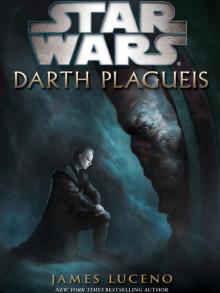 Darth Plagueis
Darth Plagueis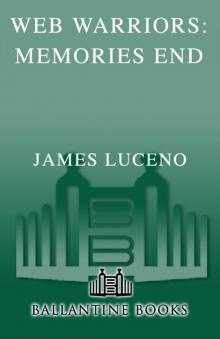 Memories End
Memories End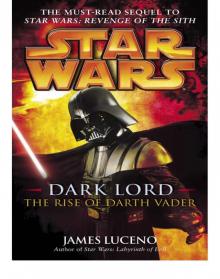 Star Wars: Dark Lord: The Rise of Darth Vader
Star Wars: Dark Lord: The Rise of Darth Vader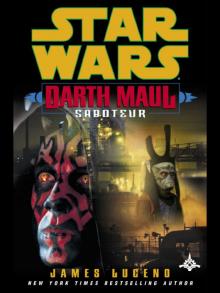 Star Wars Darth Maul: Saboteur
Star Wars Darth Maul: Saboteur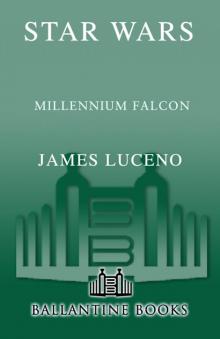 Star Wars: Millennium Falcon
Star Wars: Millennium Falcon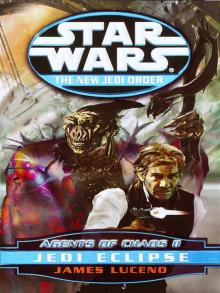 Jedi Eclipse
Jedi Eclipse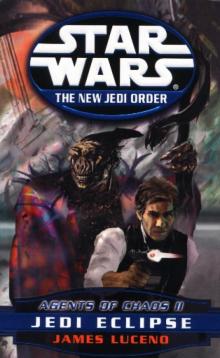 Star Wars The New Jedi Order - Agents of Chaos II - Jedi Eclipse - Book 5
Star Wars The New Jedi Order - Agents of Chaos II - Jedi Eclipse - Book 5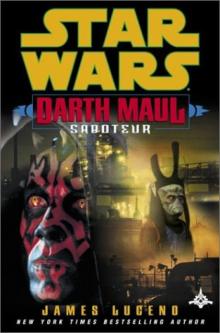 Star Wars - Darth Maul - Saboteur
Star Wars - Darth Maul - Saboteur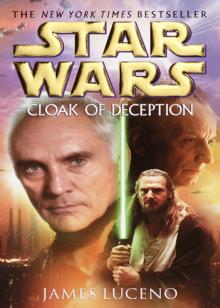 Star Wars: Cloak of Deception
Star Wars: Cloak of Deception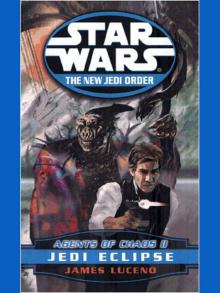 Star Wars: New Jedi Order: Agents of Chaos II: Jedi Eclipse
Star Wars: New Jedi Order: Agents of Chaos II: Jedi Eclipse End Game
End Game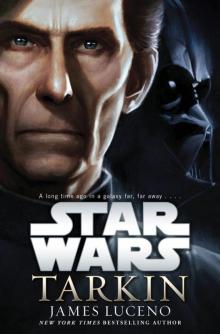 Tarkin: Star Wars
Tarkin: Star Wars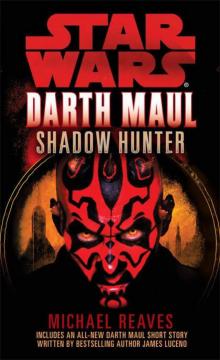 Restraint
Restraint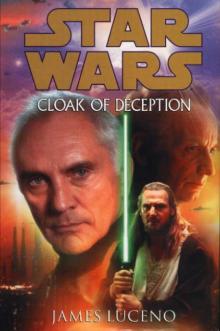 Star Wars - Cloak Of Deception
Star Wars - Cloak Of Deception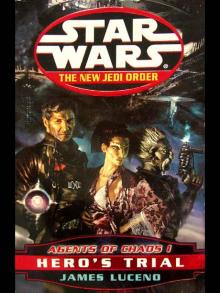 Star Wars: New Jedi Order: Agents of Chaos I: Hero's Trial
Star Wars: New Jedi Order: Agents of Chaos I: Hero's Trial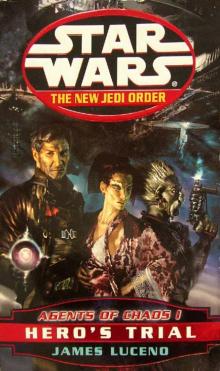 Star Wars The New Jedi Order - Hero's Trial - Book 4
Star Wars The New Jedi Order - Hero's Trial - Book 4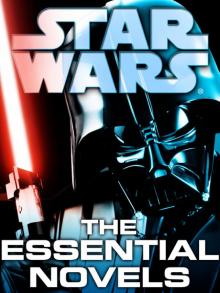 The Essential Novels
The Essential Novels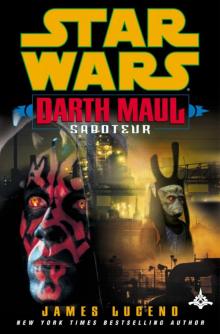 Darth Maul: Saboteur
Darth Maul: Saboteur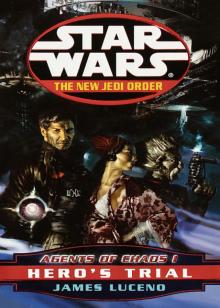 Hero's Trial: Agents of Chaos I
Hero's Trial: Agents of Chaos I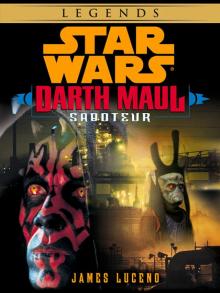 Saboteur
Saboteur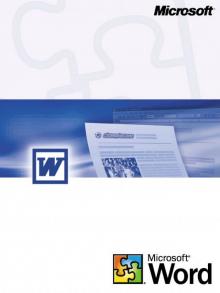 The Unifying Force
The Unifying Force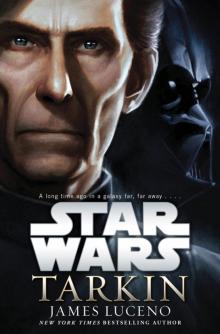 Tarkin
Tarkin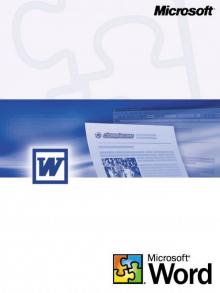 Dark Lord : The Rise of Darth Vader
Dark Lord : The Rise of Darth Vader Catalyst
Catalyst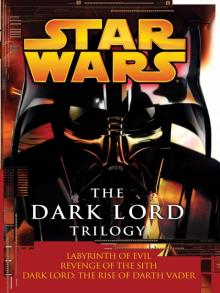 Book 0 - The Dark Lord Trilogy
Book 0 - The Dark Lord Trilogy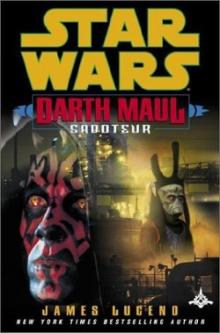 Darth Maul: Saboteur (star wars)
Darth Maul: Saboteur (star wars)